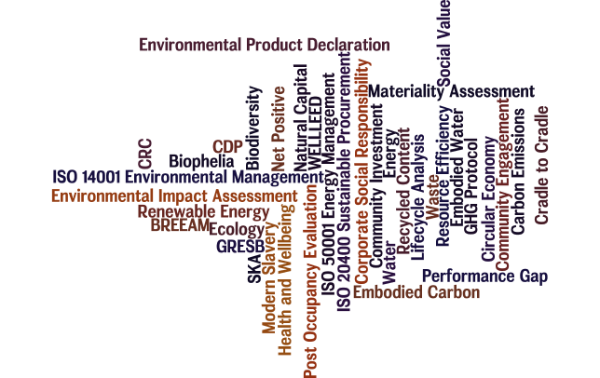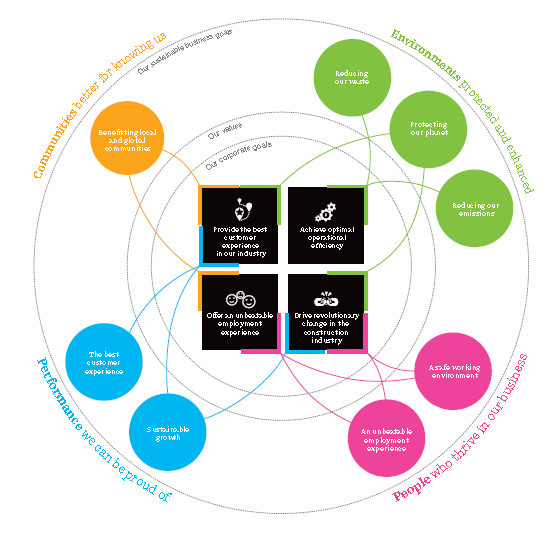

Sustainability, can you define it?
Peter Kelly, Head of Sustainability, Fit out and Engineering Services
As sustainability professionals, we intuitively understand the broad concepts and the multi-faceted nature of those interactions that encompass our company's sustainability vision - but how many of us could realistically claim that our colleagues genuinely understood what this means or even what it is that we do?
The awkward truth is perhaps far fewer than we would like, and the thing about a company's sustainability vision is that we need everyone pulling together to achieve the ambitious targets that we set. In this respect we don’t help ourselves as a discipline, just look at the word cloud below to see the collision of concepts and phrases relevant to sustainable practice in the built environment and think how incongruous our world must be to a non-specialist.

The classic Bruntland report defines sustainability as development that meets the needs of the present without compromising the ability of future generations to meet their own needs. A quick internet search shows that as this definition is the most frequently returned, it hasn't been surpassed in terms of its intent, although there has been some criticism as to its clarity. We therefore need to ensure that when defining sustainability, clarity leads to clear understanding from our stakeholders.
When we mapped out our communication strategy at ISG, we identified three core challenges fundamental to widespread adoption of class-leading sustainable practices:
1. A large number of complex concepts
2. A lack of clarity about how these concepts come together to encompass sustainability
3. An unwillingness to grasp this problem and gain consensus on the solution or solutions.
This insight provided us with a communication framework that placed a key emphasis on simplification and demonstration. So, explain in non-technical terms why something is important and then demonstrate why changing our processes or behaviour has a beneficial impact.
Defining sustainability at ISG
We were clear that if it wasn't embedded within our overall corporate culture and values - then sustainability would never achieve its ambitious goals. ISG’s 2021 sustainable business strategy identifies four key focus areas: People, Performance, Communities and Environments. Our targets in these areas strongly mirror our corporate goals around customer satisfaction, employment experience, operational efficiency and driving revolutionary change in the industry. The diagram maps how our sustainable business goals feed into the corporate goals, which in turn support ISG’s values and vision to become the world’s most dynamic construction services company, delivering places that help people and businesses thrive.

Developing a sustainability strategy that supports the achievement of business objectives is far more likely to be successful than a strategy that sits in isolation. We also tied the strategy in with our corporate values, so that employees can apply the principles in their day-to-day activities. In internal communications we encourage our people to dream smart, speak frankly, always care and never stop learning, with sustainability at the heart of their decision-making processes.
Our strategy was also developed to address our material impacts. We engaged with internal and external stakeholders to determine what our material impacts were and identified risks and opportunities to narrow our focus. We set targets for every year up to 2021 and report our progress annually. We are increasingly looking to challenge ourselves, and this year, have based our greenhouse gas targets on climate science.
This approach ensures our strategy is both relevant and tangible to our stakeholders, with employees clear on how their actions impact our performance.
By focusing on the communication outputs and rooting sustainability into the corporate success narrative, we have energised 2,800 advocates across our business into sustainable business practice. It's not a series of campaigns anymore, but simply how ISG operates across the globe – and this is a template that is eminently transferable to any business striving to be a truly sustainable business.
The next logical step for us will be to produce an integrated report, pulling together our integrated thinking. Watch this space!

